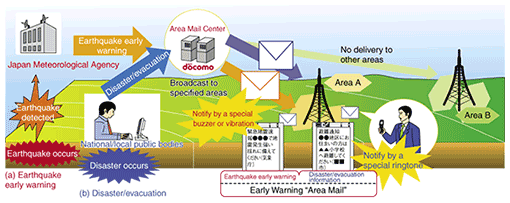 When I first heard about a powerful earthquake, the obvious feeling was one of alarm but when told that the target was Japan, my stress had considerably decreased. Of course, the magnitude (8.9 Richter) did sound far bigger than any other earthquake I had heard or read about, but still I expected loss of lives on a much lesser scale than had it hit any other country. Just a couple of days back I was going through the report covering Russia-UK collaboration to launch new generation satellites for real times monitoring of seismic activities and eventually build tools for prediction.
When I first heard about a powerful earthquake, the obvious feeling was one of alarm but when told that the target was Japan, my stress had considerably decreased. Of course, the magnitude (8.9 Richter) did sound far bigger than any other earthquake I had heard or read about, but still I expected loss of lives on a much lesser scale than had it hit any other country. Just a couple of days back I was going through the report covering Russia-UK collaboration to launch new generation satellites for real times monitoring of seismic activities and eventually build tools for prediction.It is difficult to not think of Japan when dwelling on seismic activities, after all it is the most disaster prone area even in a region called "ring of fire" and experiences about a 100,000 earthquakes every year! Even our school text-books haves taught us how the Japanese building are made to and at the same time the Japanese are some of the most resilient, innovative and technologically advanced peoples in the world. True enough, while the US, UK,Russia and others are trying to come up with a earthquake prediction mechanism, Japan is one step ahead of them, in October 2007, it launched an automated earthquake warning system which could issue warnings seconds before the impact.[ more http://www.jma.go.jp/jma/en/Activities/eew1.html]
 Now, unlike weather forecast systems, the earthquake warning system is not really forecasting or prediction system. During an earthquake, the primary waves are fast but too weak to cause disturbance, its the slower secondary waves that cause the devastation. However, seismograph can pick up the primary waves and raise alert, but a single instrument may not be that effective since the time gap is only of few seconds. The automated system links 1000 seismographs across Japan with a fast network that can together be used to calculate the strength and location of the quake and issue a warning system. Later,major cellular phone carriers of Japan had already implemented a mechanism to automatically route government warning to their phone users.
Now, unlike weather forecast systems, the earthquake warning system is not really forecasting or prediction system. During an earthquake, the primary waves are fast but too weak to cause disturbance, its the slower secondary waves that cause the devastation. However, seismograph can pick up the primary waves and raise alert, but a single instrument may not be that effective since the time gap is only of few seconds. The automated system links 1000 seismographs across Japan with a fast network that can together be used to calculate the strength and location of the quake and issue a warning system. Later,major cellular phone carriers of Japan had already implemented a mechanism to automatically route government warning to their phone users. This is the first time that the automated warning system was triggered and it is quite likely that it was successful. Although, the extent of loss in terms of human lives is not yet clear, news agencies report that the automated warning sent through cell phones, TV and radio ( Twitter ?) had reached people in Tokyo before the shock-waves did. Of course, Tokyo is not exactly close to the epicenter, those nearer to epicenter had very little warning, neither of the earthquake nor the tsunami which caused maximum damage. Yet, if it did manage to save a few lives, the Japanese people have once again proved their mettle. It might sound insensitive but an earthquake of this magnitude in South Asia or South East Asia would have ended with hundreds of thousands of human lives. In case of India, our administrators are so immersed in corruption and gluttony, one wouldn't be surprised even if entire generations had been wiped out.
Update
- According to Telegraph, the warning was issued 1 minute before the earthquake
- In other news, Japan has admitted that its 2 nuclear reactors have been affected and has warned of radiation leak
.
[ The warning system is maintained by Japanese Meteorological Agency ]
No comments:
Post a Comment